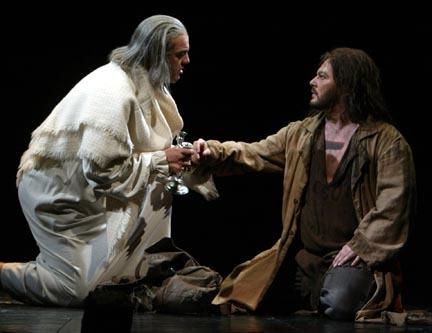Before he passed away, Pope John Paul II entrusted a number of his personal letters to Cardinal Stanislaw Dziwisz, his secretary, and asked him to burn the letters after the pontiff was dead. Not only did Cardinal Dziwisz fail to carry out the pope’s wishes, he is now releasing the edited papers as a book.
The Cardinal is releasing the private notes because he finds them spiritually lovely, not because there’s some very exciting secret or scandal contained within. But, for me, the most interesting part of this story has been this remark by R. Andrew Chesnut, as reported by The New York Times.
R. Andrew Chesnut, a professor of religious studies at Virginia Commonwealth University, noted that the book was not covered by the dogma of papal infallibility, which applies to pronouncements of church doctrine but not to a pope’s personal musings. In the end, he said, John Paul would probably have absolved the cardinal for what some consider a moral transgression.
“The pope, though he may have been irritated, would have forgiven him,” he said.
There’s a very curious understanding of absolution in these two paragraphs. If forgiveness is extended, it seems to say, the fault couldn’t have been that severe. The pope’s presumptive forgiveness is enough to, in the phrasing of the article, downgrade a moral transgression to an irritation.
To forgive someone is not to sanction or endorse the previous transgression. And it’s not a prerequisite that the person forgiven have acted in good faith or in the service of some competing good. The pope could just as easily forgive an assassin (as, indeed, he did), but his act of charity wouldn’t leave us saying that the whole attempted assassination was morally negligible.
Otherwise, we’re selling forgiveness short. We’re saying it can only be extended to the people who aren’t really bad at all; it’s more like the perfunctory “Sorry!” “’Sokay” when you bump into someone on the subway.
When we talk about forgiveness, we’re often talking about acceptance, warts and all. If the Pope forgave the Cardinal, he must accept all of him, including his broken promise, so the broken promise can’t be that serious, if it, too, can be accepted and loved.
But absolution looks more like reminding ourselves which parts of us should be accepted and which should be opposed. When a penitent comes seeking forgiveness or absolution, whether in a confessional or from a friend, ze has already distanced zerself from zer sin. Not in the sense of forgetting about the act or ignoring it, but by regretting it and recognizing it as alien to zerself and zer telos.
When someone offers us forgiveness, he or she is recognizing in turn that we are not our sin. It’s more akin to a cancerous grown that we struggle to corral. It’d be odd to hear someone say, “I love and value all of you, including your tumor!” It would be just as strange to say, “I accept all of you, including your sin” since that would mean granting sin some legitimate tenancy within us.
When we forgive someone, we acknowledge sin as sin without essentializing it. The forgiveness the pope would offer would be removing the Homeric epithet of “the oathbreaker Cardinal” or “the assassin Mehmet Ali Aǧca” and restoring us as “the child of God, who broke an oath.”
Sin is something we do, not something we should give up and say we are. Seeking forgiveness begins when we recognize and detest our sins, and is extended when a friend agrees with us, and shows us that it’s possible to loathe them and love us.
This is the second day of our Novena to St. Dymphna. You can find the prayers here and a little background on why we’re praying it here.













